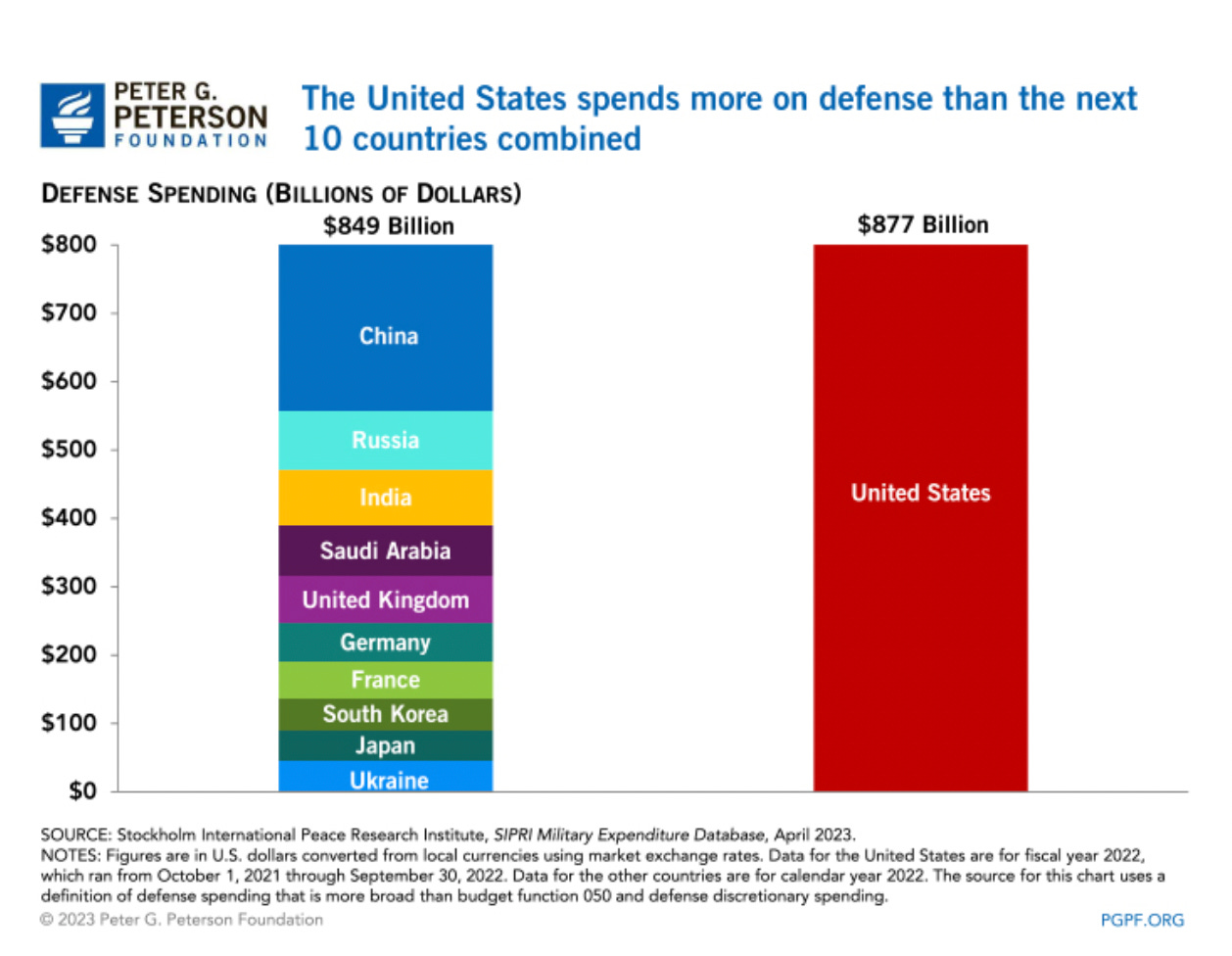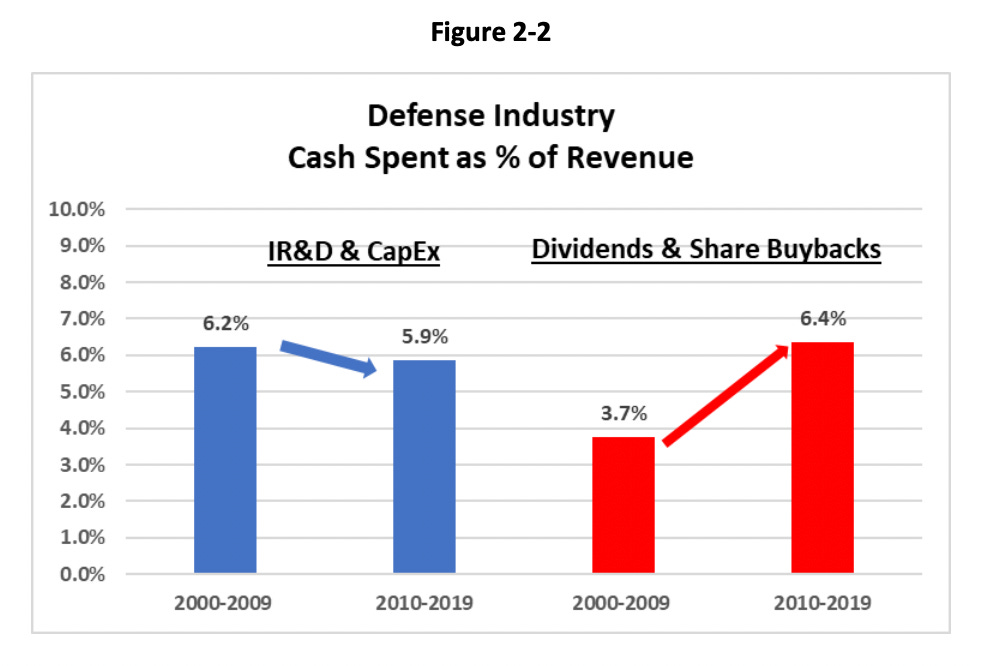There is always more money for defense contractors
Popular Information doesn't just break news; it creates change. Consider the impact this newsletter has had over the last few weeks:
But today, this newsletter's future is in doubt. About half of our current readership found out about Popular Information through Twitter. And now Twitter is controlled by Elon Musk, a billionaire who has embraced right-wing politics. Musk is using Twitter to promote his own views. He's even used his power to suppress links from Substack, the service we use to publish this newsletter. That's why I need your help. Popular Information has 262,000 readers, but only a small percentage are paid subscribers. If a few more readers upgrade to paid, Popular Information can invest in alternative growth strategies, reach more people, and produce more groundbreaking accountability journalism. In 2023, Republicans and Democrats are deeply divided on nearly every significant policy issue. But there is an exception to the rule. Both parties can always agree on sending more money to defense contractors. The agreement between President Joe Biden and House Speaker Kevin McCarthy (R-CA) to raise the debt limit for two years, if approved by the House and Senate, will avert a potential economic catastrophe. Biden started off demanding a "clean" debt limit increase with no extraneous provisions. McCarthy sought deep cuts in domestic discretionary spending and large increases in military spending in exchange for raising the debt limit. The compromise, reached Sunday, includes a small decrease in domestic discretionary spending and a record $886 billion for defense, a 3.3% increase over the current year. The money allocated for the defense budget is exactly what Biden requested in the 2024 budget. Notably, about half of that money will go to defense contractors. In 2015, the United States spent $585 billion on its military. The United States has added more than $300 billion in military spending in less than a decade. (Had military spending kept pace with inflation, military spending would still be less than $700 billion annually.) Biden has added nearly $150 billion to the military budget since 2021, the last budget approved by President Trump. The budget of the Pentagon now exceeds "the budgets for the next ten largest cabinet agencies combined." In 2020, Lockheed Martin received $75 billion in government contracts, more than 1.5 times the budget of the entire State Department. Last year, the United States spent more on its military than the next 10 highest-spending countries combined: Some defense hawks dismiss this statistic, claiming that countries like China have more "purchasing power." This only underscores the waste and abuse endemic to America's military-industrial complex. This military spending increase has occurred even as Biden ended the war in Afghanistan, the military's longest-running and most costly foreign intervention. But there is no "peace dividend." Each year, the costs go up dramatically. What would be the impact on national security if the military budget was $786 billion next year instead of $886 billion? This is a discussion that does not regularly occur among top national political leaders. Instead, support for more military spending is equated with "supporting the troops" and "keeping people safe." Any suggestion that spending could be trimmed is derided as naive and dangerous. Military contractors have taken advantage of the political dynamics. According to a 60 Minutes investigation that aired earlier this month, "[m]ilitary contractors overcharge the Pentagon on almost everything the Department of Defense [DoD] buys each year." The problem has its roots in the early 1990s "when the Pentagon, looking to reduce costs, urged defense companies to merge and 51 major contractors consolidated to five giants." That means there was no longer much competition for defense contracts. The Defense Department has few options today, and the defense contractors know it. The issue became more severe "in the early 2000s when the Pentagon, in another cost-saving move, cut 130,000 employees whose jobs were to negotiate and oversee defense contracts." Today the Pentagon, with limited oversight capacity, relies "on the companies to do what [is] in the best interests of the war fighters and the taxpayers." It is not working out well. The skyrocketing cost of one missile In 1991, when there was genuine competition for military contracts, the cost of one shoulder-fired stinger missile was $25,000. Now, defense contractor Raytheon is the sole supplier. The missiles are in high demand because they are being sent to Ukraine to fend off invading Russian forces. The current cost for one missle is $400,000. Even accounting for inflation, that is a seven-fold increase. Separately, the Pentagon "caught Raytheon making what they called 'unacceptable profits' from the Patriot missile defense system by dramatically exaggerating the cost and hours it took to build the radar and ground equipment." Meanwhile, Lockheed Martin and Boeing were found to be "grossly overcharging the Pentagon and U.S. allies by hundreds of millions of dollars for the Patriot's PAC-3 missiles." The profit margin for the weapons approached 40%. A Department of Defense report released last month concluded that the five major defense contractors "generate substantial amounts of cash beyond their needs for operations or capital investment." These firms "generate total returns to shareholders well in excess of what one might expect given their relative low risk to investors." Further, the companies are now spending more money on stock buybacks to increase their share prices than on research & development and capital expenditures. None of this has prompted any reconsideration of the wisdom of simply plowing more money into the Defense Department. Rigging the game Over the last 20 years, the defense industry has "spent $2.5 billion on lobbying." During that period, defense contractors employed an average of 700 lobbyists — more than one lobbyist for every member of Congress. All this spending on lobbying has enabled military contractors to alter laws and regulations for their own benefit. For example, "if a company is selling something that is considered a commercial item, they don’t have to give the Pentagon the same information about cost and pricing than they would if it was a noncommercial." The idea is "if you are selling something that is commercial, you can assume that it is competitively priced." But the defense industry has successfully lobbied Congress "to redefine what commercial means," allowing non-commercial items (things that are not sold to the public) to be designated as commercial. According to a recent Pentagon report, Boeing refused to provide cost data for 10,659 replacement parts between from October 2020 through September 2021. In a May 24 letter, Senator Elizabeth Warren (D-MA) and Congressman John Garamendi (D-CA), call Boeing's refusal "to provide basic information to DoD contracting officers are absurd and unacceptable." Without data on underlying costs, it is impossible "to determine if [Boeing's] prices are fair and reasonable." Another issue is that while the government pays defense contractors to design and build complex weapons systems like the F-35 Joint Strike Fighter program, the contractors retain "control of the design and repair data, the proprietary information needed to fix and upgrade the plane." So if the planes break, which they often do, the military cannot fix the issue. Instead, it must pay the defense contractor again. Support and maintenance of the F-35 "could end up costing taxpayers $1.3 trillion." |
Older messages
Tennessee Speaker appoints conspiracy theorist to develop state social studies standards
Thursday, May 25, 2023
Last week, Tennessee House Speaker Cameron Sexton (R) announced that he had appointed Laurie Cardoza-Moore to serve on the Tennessee Standards Recommendation Committee to oversee “Social Studies
"Reimagining political journalism"
Wednesday, May 24, 2023
Yesterday, Popular Information was featured in the Washington Post as one of a handful of "news outlets reimagining political journalism in smar…
Mika Westwolf matters
Tuesday, May 23, 2023
In the early morning of March 31, Mika Westwolf, a 22-year-old Indigenous woman, was walking on the shoulder of US Highway 93, which passes through the Flathead reservation. Westwolf was struck by a
Off Target
Monday, May 22, 2023
Last week, major news outlets reported that Target expects to suffer an additional $500 million in losses due to a surge in "organized retail crime." There is one major problem with these
UPDATE: New federal lawsuit says Florida book bans are unconstitutional
Thursday, May 18, 2023
Since December, Popular Information has detailed the extraordinary number of book bans being pursued in Escambia County, Florida. Much of this activity is being driven by one woman, high school English
You Might Also Like
UW and computer science student reach truce in ‘HuskySwap’ spat
Saturday, January 11, 2025
Blue Origin set for first orbital launch | Zillow layoffs | Pandion shutdown | AI in 2025 ADVERTISEMENT GeekWire SPONSOR MESSAGE: GeekWire's special series marks Microsoft's 50th anniversary by
Cryptos Surrender Recent Gains | DOJ's $6.5 Billion Bitcoin Sale
Saturday, January 11, 2025
Bitcoin and other tokens retreated as Fed signaled caution on rate cuts. Forbes START INVESTING • Newsletters • MyForbes Presented by Nina Bambysheva Staff Writer, Forbes Money & Markets Follow me
Just Buy a Balaclava
Saturday, January 11, 2025
Plus: What Raphael Saadiq can't live without. The Strategist Every product is independently selected by editors. If you buy something through our links, New York may earn an affiliate commission.
Up in Flames
Saturday, January 11, 2025
January 11, 2025 The Weekend Reader Required Reading for Political Compulsives 1. Trump Won't Get the Inauguration Day He Wanted The president-elect is annoyed that flags will be half-staff for
YOU LOVE TO SEE IT: Biden’s Grand Finale
Saturday, January 11, 2025
Biden drills down on offshore drilling, credit scores get healthier, social security gets a hand, and sketchy mortgage lenders are locked out. YOU LOVE TO SEE IT: Biden's Grand Finale By Sam Pollak
11 unexpected things you can put in the dishwasher
Saturday, January 11, 2025
(And 7 things you should keep far away from there) View in browser Ad The Recommendation January 11, 2025 Ad 11 things that are surprisingly dishwasher-safe An open dishwasher with a variety of dishes
Weekend Briefing No. 570
Saturday, January 11, 2025
Black Swan Threats in 2025 -- Why Boys Don't Go To College -- US Government's Nuclear Power Play ͏ ͏ ͏ ͏ ͏ ͏ ͏ ͏ ͏ ͏ ͏ ͏ ͏ ͏ ͏ ͏ ͏ ͏ ͏ ͏ ͏ ͏ ͏ ͏ ͏ ͏ ͏ ͏ ͏ ͏ ͏ ͏ ͏ ͏ ͏ ͏ ͏ ͏ ͏ ͏ ͏ ͏ ͏ ͏ ͏ ͏ ͏ ͏
Your new crossword for Saturday Jan 11 ✏️
Saturday, January 11, 2025
View this email in your browser Take a mental break with this week's crosswords: We have six new puzzles teed up for you this week. Play the latest Vox crossword right here, and find all of our new
Firefighters Make Progress, Water Rankings, and Ohio St. Wins
Saturday, January 11, 2025
Multiple wildfires continued to burn in Southern California yesterday, with officials reporting at least 10 deaths. Over 10000 homes across 27000 acres have burned, and 20 suspected looters have been
☕ So many jobs
Saturday, January 11, 2025
So why did stocks fall? January 11, 2025 View Online | Sign Up | Shop Morning Brew Presented By Indacloud Good morning. It's National Milk Day, the one day of the year you're allowed to skim



